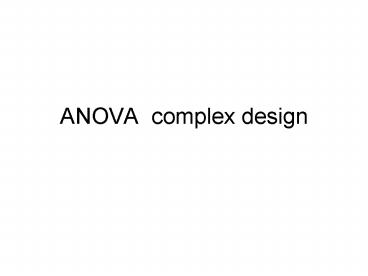ANOVA complex design - PowerPoint PPT Presentation
Title:
ANOVA complex design
Description:
analytical comparisons to clarify sources of systematic variation. conclusion from analysis ... Car Noise. The data constitute a 3-way factorial experiment ... – PowerPoint PPT presentation
Number of Views:26
Avg rating:3.0/5.0
Title: ANOVA complex design
1
ANOVA complex design
2
What is in a results section??? LOOK at the
example in your textbook. You need to have
subheading. You need to have figures and they
must have useful figure captions. You must refer
to your figures. You need to describe the data in
some way You need to describe the analyses and
what you found. Is it significant? Or not Then
add some English to describe what you found.
3
e.g To examine the effects of memory training on
retention of words, 20 college students were
randomly assigned to four training conditions
(n5) defined by the instructions to
participants story method, imagery method, rhyme
method, and control (no specific instructions).
Mean recall out of a possible 20 words (and the
sample standard deviation) for each condition
was story 13.2(1.3), imagery 14.4 (1.8), rhyme
13.4 (1.3) and control 10.0 (1.6). Confidence
intervals for the means in each group are shown
in figure 1. Mean recall differed significantly
among the four instruction conditions, F(3,16)
7.8, plt.05. MS 240. A paragraph that
describes what is compared and what you
found. Where I should look to find the
information.
4
Reporting results of complex design
- What kind of test
- description of variables and definitions of
levels (conditions) of each - summary statistics for cells in design matrix
(figure) - report F tests for main effects and interactions
- effect size
- statement of power for nonsignificant results
- simple main effects analysis when interaction is
statistically significant - description of statistically significant
interactions looking at cell means - description of statistically significant main
effect - analytical comparisons to clarify sources of
systematic variation - conclusion from analysis
5
Car Noise
The data are from a statement by Texaco, Inc. to
the Air and Water Pollution Subcommittee of the
Senate Public Works Committee on June 26, 1973.
Mr. John McKinley, President of Texaco, cited the
Octel filter, developed by Associated Octel
Company as effective in reducing pollution.
However, questions had been raised about the
effects of pollution filters on aspects of
vehicle performance, including noise levels. He
referred to data presented in the datafile
associated with this story as evidence that the
Octel filter was was at least as good as a
standard silencer in controlling vehicle noise
levels.
6
The data constitute a 3-way factorial experiment
with 3 replications. The factors are type of
filter (2 types), vehicle size (3 sizes), and
side of car (two sides).
7
- Number of cases 36
- DV
- NOISE Noise level reading (decibels)
- IV
- SIZE Vehicle size 1 small, 2 medium, 3 large
- TYPE 1 standard silencer ,2 Octel filter
- SIDE 1 right side 2 left side of car
8
(No Transcript)
9
(No Transcript)
10
(No Transcript)
11
(No Transcript)
12
(No Transcript)
13
(No Transcript)
14
(No Transcript)
15
Main effect Size is significant Mean small
824.16 sd 7.63 Mean medium 833.75 sd
13.5 Mean large 772.50 sd 10.33 Need post
hoc tests Main effect Type is
significant Standard mean 815.56 sd
32.2 Octel mean 804.72 sd 25.63 Dont need
post hoc tests
16
All sizes differ.
17
Interaction Size by Side is significant Need to
find out where is the difference Simple main
effects analysis Do t-test for the small And one
for the medium And one for large One anova for
left side One anova for right side
18
side
s
m
L
19
- Small size left bigger than right
- Medium size no difference
- Large size right bigger than left
20
Right
21
Left
22
- On right - small cars louder than large
- - medium cars louder than large
- - small cars quieter than medium
- On left - small cars louder than large
- - medium cars louder than large
23
Interaction Size by Type is significant Need to
find out where is the difference Simple main
effects analysis Do t-test for the small And one
for the medium And one for large One for type
standard One for type Octel
24
s
m
L
25
Standard
26
Octel
27
significant 3-way interaction. Size by type by
side Need to separate the factors so can
do 2-way analyses Hold one factor constant and
test other Eg do a 2X2 of small cars 2X2 of
medium and 2X2 of large.
28
Small car type by side
29
Test small car
Side is significant - left bigger than
right Interaction is significant
30
Small car Type t tests for the interaction
Right
Octel louder than standard
Left
31
Small car t-tests for side
Standard
Left louder than right
Octel
32
Medium car - type by side
33
Test Medium car
Type is significant standard louder than Octel
34
Large car type by side
35
Test large car
Side is significant right is louder than
left Interaction is significant -
36
Large car Type t tests for the interaction
Right
Standard louder than octel
Left
37
Standard
Octel































